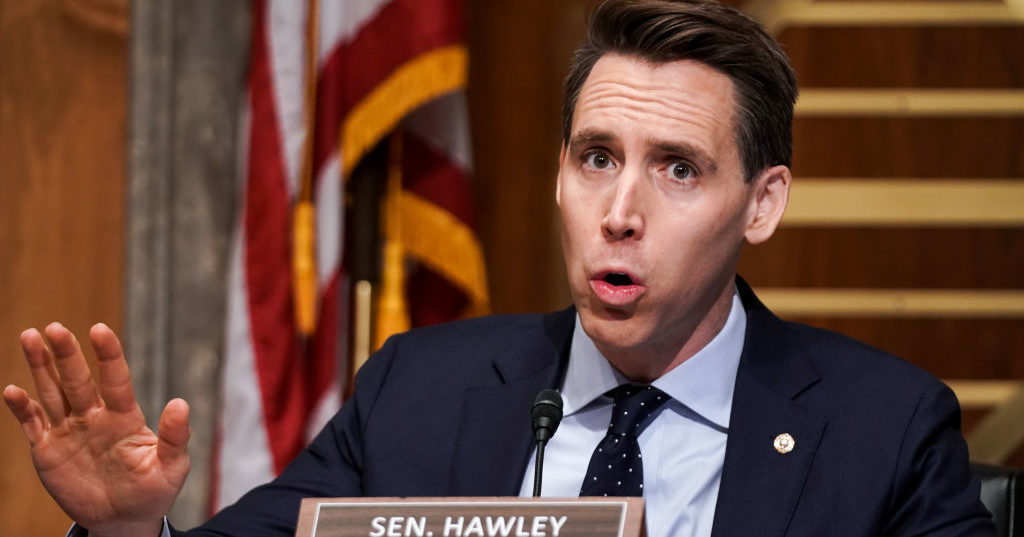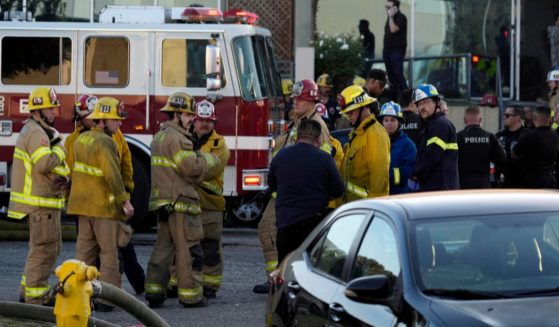
Congress Is About To Count the Electoral Votes - Here's How That Works
The congressional joint session to count electoral votes is generally a routine, ceremonious affair. But President Donald Trump’s repeated claims of victory will bring more attention than usual to next Wednesday’s joint session of the Senate and the House.
The congressional count is the final step in affirming a win for Biden, after the Electoral College officially elected him on December 14. The meeting is required by the Constitution and includes several distinct steps.
Some Republicans have said they will officially object to the results, forcing votes in the Republican-run Senate and the Democratic-controlled House that will likely fail. A group of House Republicans had been looking for a senator to sign on because there must be support from at least one member of each chamber to force the votes.
That support came on Wednesday from Missouri Sen. Josh Hawley, a possible contender in the 2024 GOP presidential primary.
Hawley’s challenge comes despite a plea from Senate Majority Leader Mitch McConnell that Republican senators not join the House effort. McConnell told his caucus on a private call earlier this month that it would be a “terrible vote” for Senate Republicans to have to take.
A look at the joint session:
WHAT HAPPENS WHEN CONGRESS MEETS IN JANUARY?
Under federal law, Congress must meet on January 6 to open sealed certificates from each state that contain a record of their electoral votes. The votes are brought into the chamber in mahogany boxes.
Bipartisan representatives of both chambers read the results out loud and do an official count. The president of the Senate, Vice President Mike Pence, presides over the session and declares the winner.
WHAT DOES THE CONSTITUTION REQUIRE?
The Constitution requires Congress to meet and count the electoral votes. If there is a tie, then the House decides the presidency, with each congressional delegation having one vote. That hasn’t happened since the 1800s, and Biden’s electoral margin over Trump stands at 306-232.
HOW DOES THE SESSION UNFOLD?
The two chambers meet midday to count the votes. If the vice president cannot preside, there is precedent for the Senate pro-tempore, or the longest-serving senator in the majority party, to lead the session. That’s currently Republican Sen. Chuck Grassley.
The presiding officer opens and presents the certificates of the electoral votes in alphabetical order of the states. The appointed “tellers” from each chamber, members of both parties, then read each certificate out loud. The tellers record and count the votes, The presiding officer announces who has won the majority votes for both president and vice president.
WHAT IF THERE’S AN OBJECTION?
After a teller reads the certificate from a state, any member can stand up and object to that state’s vote on any grounds. But the presiding officer will not hear the objection unless it is in writing and signed by both a member of the House and a member of the Senate.
If there is such a joint request, then the joint session suspends and the House and Senate go into separate sessions to consider it. For the objection to be sustained, both chambers must agree to it by a simple majority vote. If they do not both agree, the original electoral votes are counted.
The last time such an objection was considered was 2005, when Rep. Stephanie Tubbs Jones of Ohio and Sen. Barbara Boxer of California, both Democrats, objected to Ohio’s electoral votes by claiming there were voting irregularities that led to President George W. Bush’s reelection win. Both chambers debated the objection and rejected it. It was only the second time such a vote had occurred.
MIGHT A CHALLENGE SUCCEED?
It’s extremely unlikely, given that the House is controlled by Democrats and that several Senate Republicans, including McConnell, have acknowledged Biden as the victor. McConnell asked his fellow Republican senators on the private call Dec. 15 not to join in any House objection.
Several other high-ranking Republicans agreed. The Senate’s No. 2 Republican, South Dakota Sen. John Thune, said earlier this month that if the Senate were forced to vote on a challenge “it would go down like a shot dog.” Thune said it didn’t make sense to put senators through a vote when “you know what the ultimate outcome is gonna be.”
Sen. John Cornyn said any such effort by his fellow congressional Republicans would be “futile” and a mistake.
“I think there comes a time when you have to realize that, despite your best efforts you’ve been unsuccessful,” he said earlier this month.
WHAT IS PENCE’S ROLE?
The role of the vice president as presiding officer is often an awkward one, as it will be for Pence, who will likely be charged with announcing Biden’s victory — and his own defeat — once the electoral votes are counted. It will be especially tense for the former Indiana congressman because his running mate, Trump, has refused to concede.
But he won’t be the first vice president put in an uncomfortable situation. In 2001, Vice President Al Gore presided over the counting of the 2000 presidential election he narrowly lost to Republican George W. Bush.
Gore had to gavel several Democrats’ objections out of order, despite his own lengthy objection to the results of the election.
In the last election cycle, Biden presided over the count that declared Trump the winner. Biden also shot down objections from House Democrats that did not have any Senate support.
ONCE CONGRESS COUNTS THE VOTES, WHAT’S NEXT?
The joint session is the last official chance for objections, beyond court cases that have so far proven ineffective for Trump and his team.
The Western Journal has reviewed this Associated Press story and may have altered it prior to publication to ensure that it meets our editorial standards.
Truth and Accuracy
We are committed to truth and accuracy in all of our journalism. Read our editorial standards.
Advertise with The Western Journal and reach millions of highly engaged readers, while supporting our work. Advertise Today.












